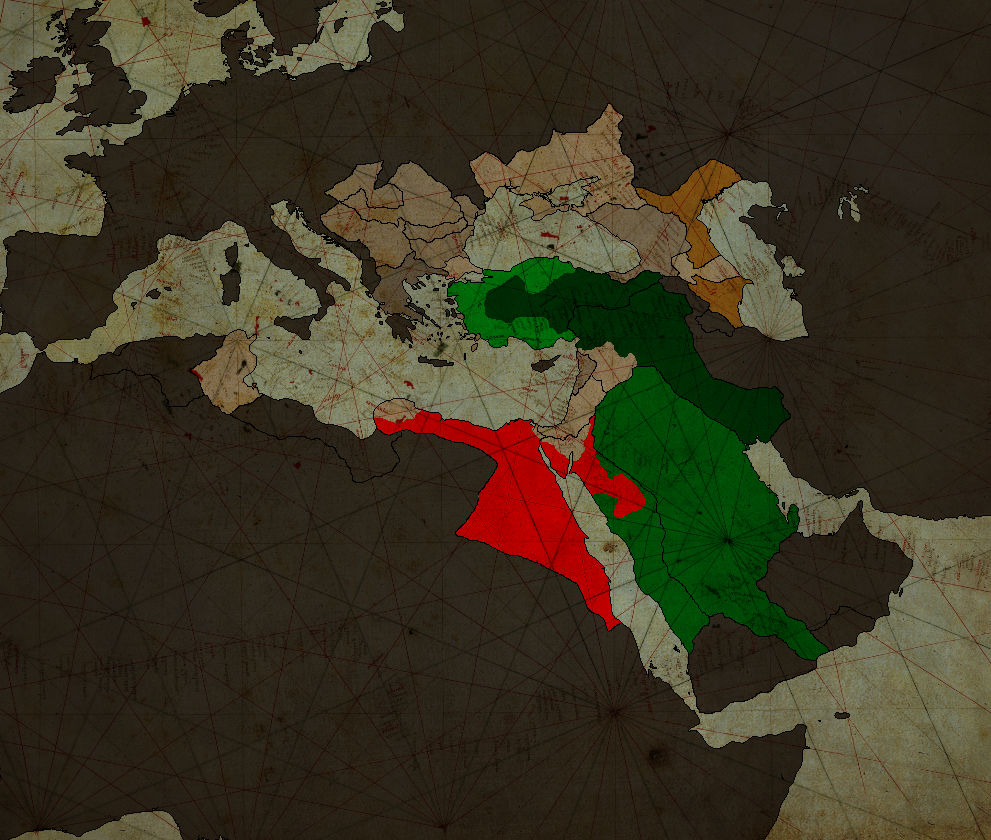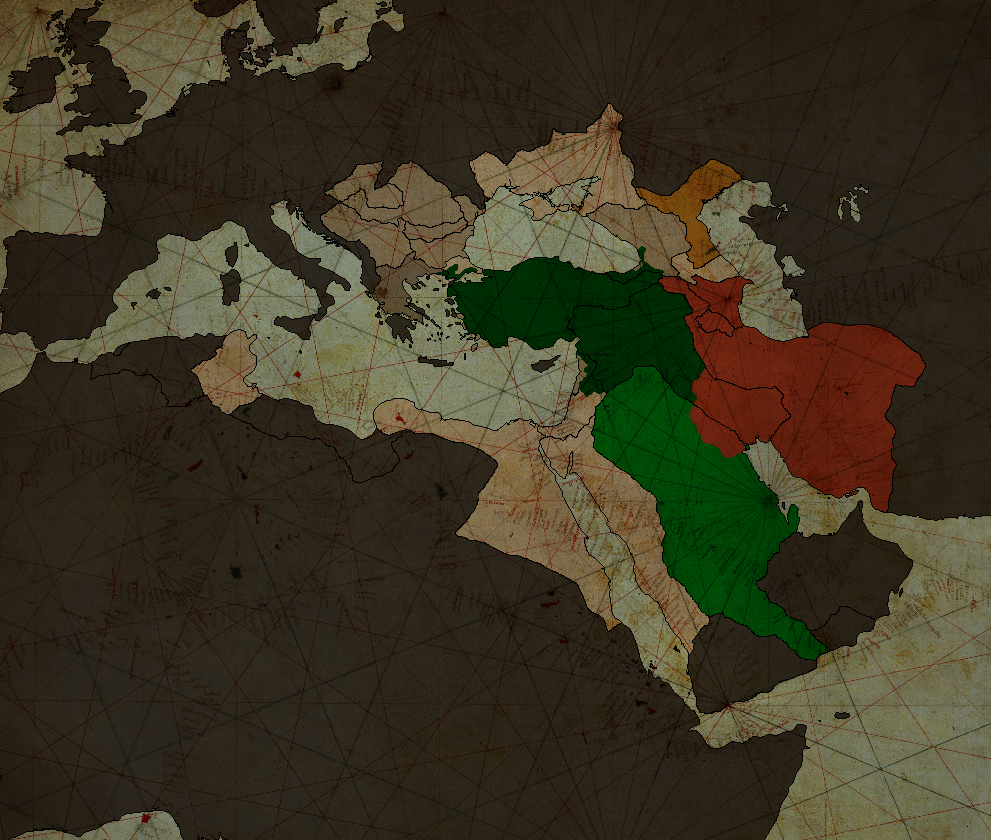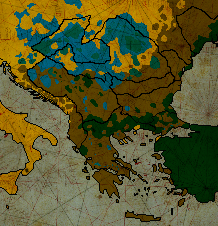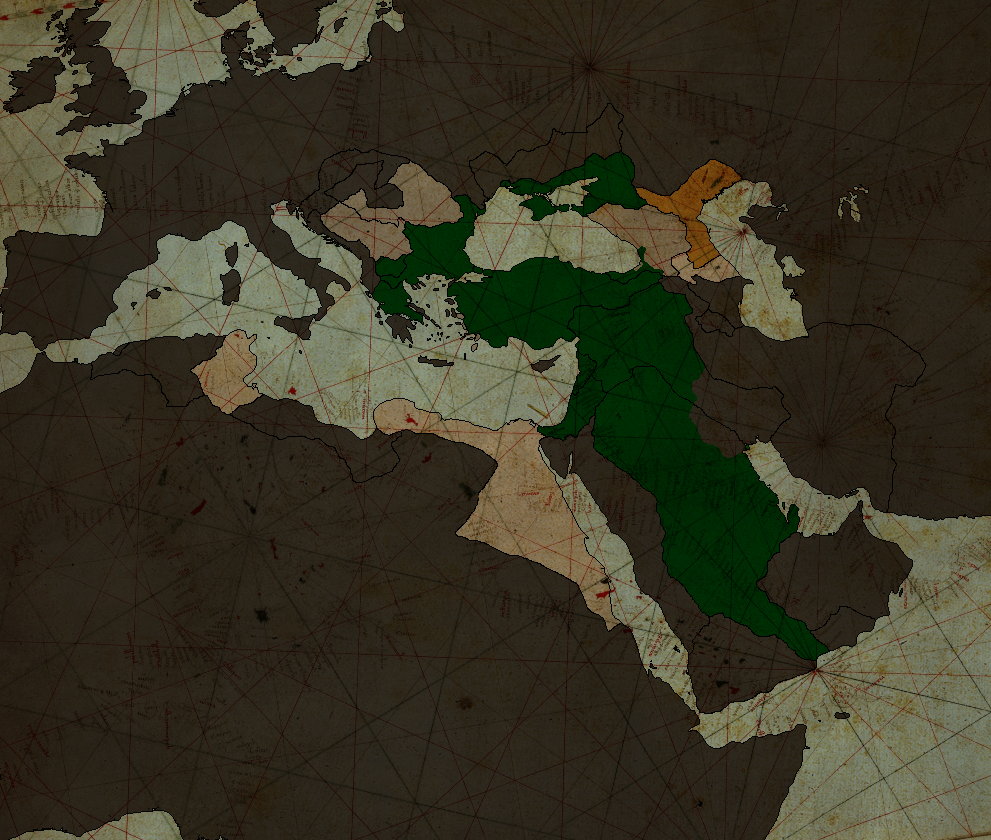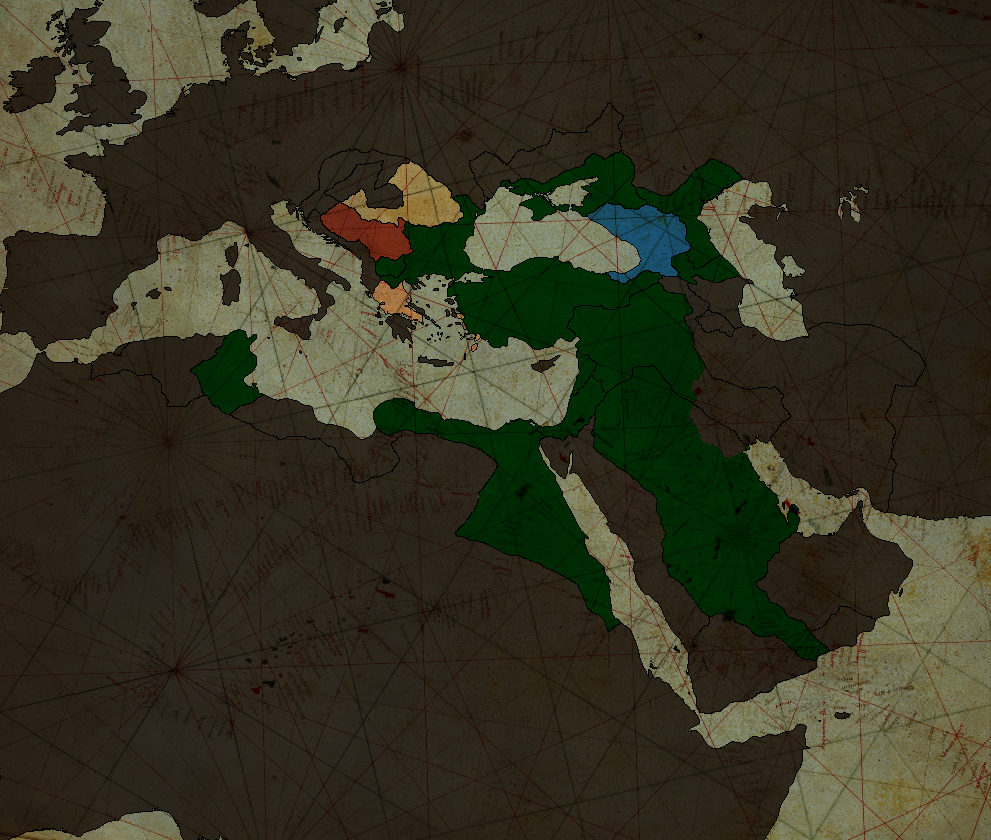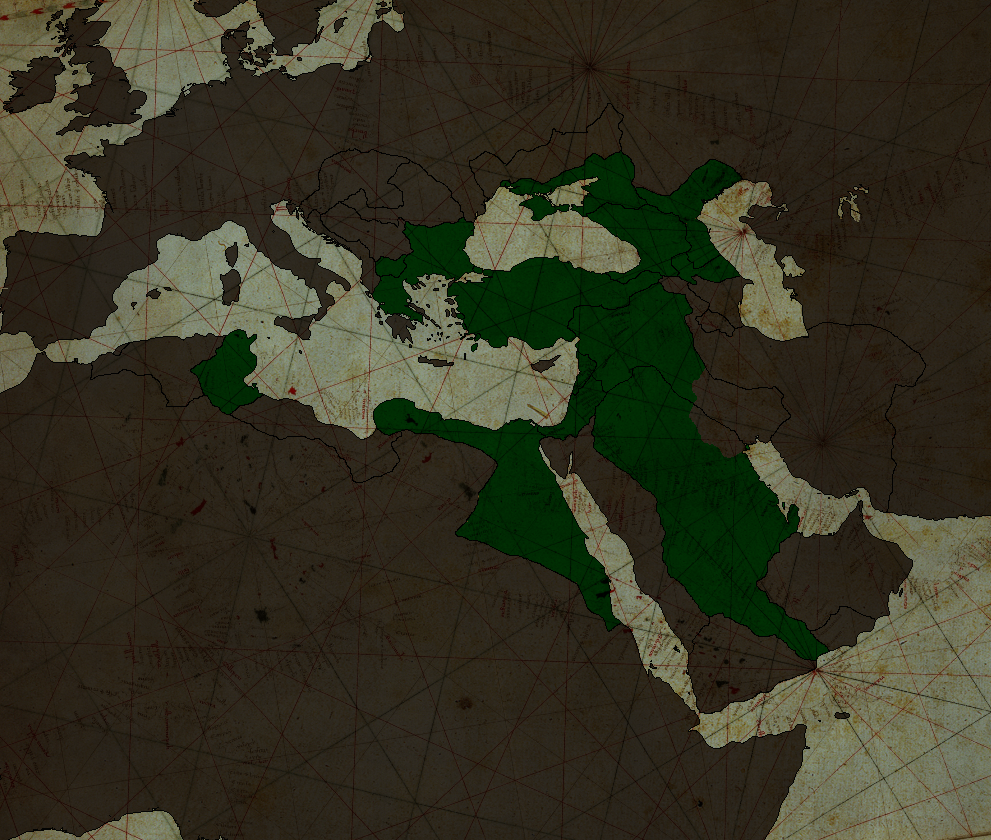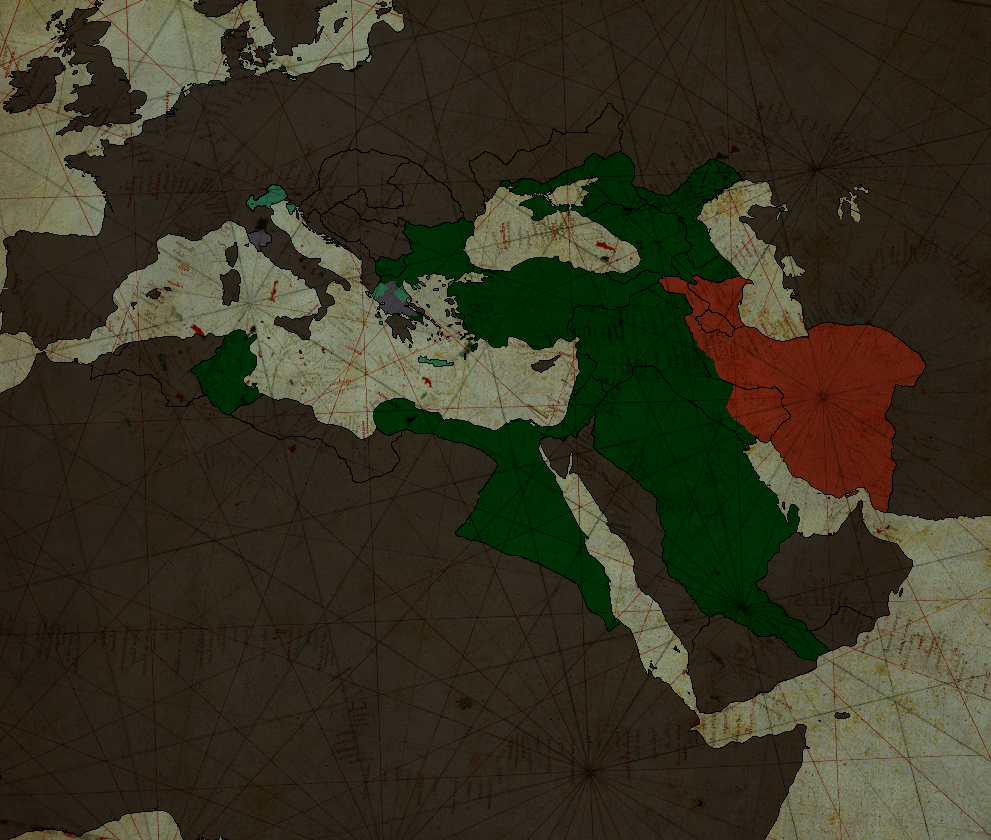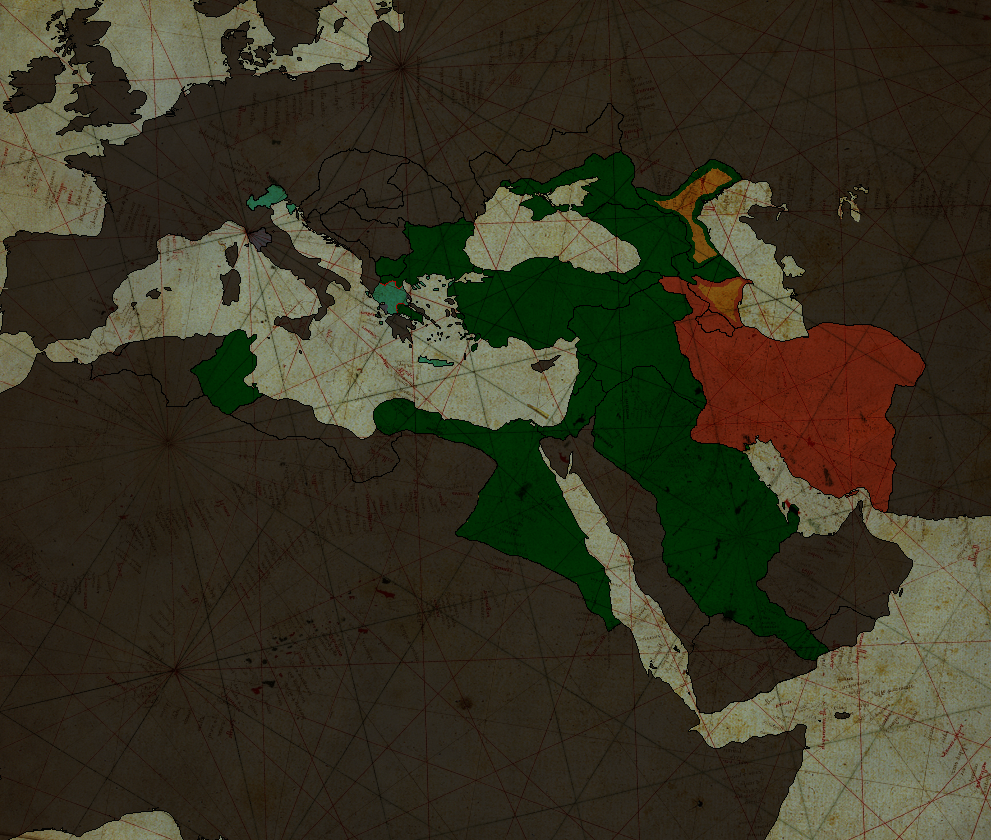Warning, this post contains copious amounts of Duke Devlin.
@Enewald: Where's the fun in that?
Ibrahim's conquest of Hungary and Suleiman's victory over Persia marked the last external threat either regent would face, as by this point the Ottoman Empire was indisputably the most powerful nation of the world. The only hostilities that brought themselves to the Ottoman Table would be a brief rebellion in Bosnia which would spill over into Serbia and Ottoman Hungary before being quelled by Ibrahim, and a rebellion in the territories seized from Persia which would prove significantly more damaging.
The Rebellion in Bosnia drew initially from issues with Ibrahim's reorganized conscription laws which the local governor was incapable of enforcing. The Rebellion itself lasted only four months, quickly seizing control of Bosnia and Serbia and executing the Governors Ibrahim had appointed there. While Ibrahim gathered his troops in Bulgaria, the army of Transylvania was already moving East under the command ot Stephen Báthory, the Governor-General appointed to administrate the area.
Although it would be Ibrahim who would finally defeat the Revolutionary army in Bosnia and destroy it, Stephen's efforts would push the armies from Serbia. Ibrahim would officially take control of Stephen's army to persue the revolutionaries, leaving Stephen in control of the land they had reconquered. Although Stephen would not gain control of Serbia itself, this period of time would see him gain great influence in Serbia and Bosnia. Although Stephen would never rule as Duke of Transylvania, instead passing that honor on to his brother Mihály, he retains dominance over the affairs of Transylvania to this day.
Stephen and his family would remain loyal to the Ottoman Empire until the death of Ibrahim. In return for their loyalty and ability, the administrative region of Transylvania saw a massive gain in territory, drawing virtually the whole of Ottoman Hungary under its control. Serbia and Bosnia would be merged into a single unit under the control of Ibrahim himself for several years before being passed to a hand picked General.
At the other end of the Empire, Suleiman himself had been likewise called to deal with a revolt in the recently conquered Persian Lands, which would remain a financial and military drain on the Empire's resources. Suleiman's son Jem had contributed several victories to suppressing the revolutionaries, and had himself dealt with this problem since the acquisition of the territory, however by 1581 the situation had spiraled out of his control.
Suleiman's entrance into the conflict would by its very nature greatly reduce the ability of the revolting powers, as it became increasingly clear that they were being funded by the Persian Shah himself, fresh from a crushing victory over the small states of the East. However, the presence of Suleiman and an astounding one quarter of the Ottoman Army on their border would make a potential war far too likely and of too great a risk to allow.
The remaining rebels would be swiftly defeated and pushed once more into Persia itself, bringing the area to some semblance of peace. The true end result of this rebellion would be the deepening rivalry between Suleiman's two sons. Suleiman had at this point not named his successor for Eastern Regent of the Ottoman Empire, and this rebellion prompted Suleiman's eldest son, Mustafa, to present his case for successor, citing this as an obvious example of Jem's lack of ability.
Suleiman would not entertain these discussions and made no change to the succession or lack there of, thus leaving the succession still uncertain throughout all of the Ottoman Empire. Although the Sultan himself still reigned in title and had a chosen successor, his lack of power rendered this pointless. In contrast, neither Suleiman nor Ibrahim had defined any sort of succession for the positions of Regent. Suleiman had not decided between his two sons, and Ibrahim had no sons having never married. Why this was the case remains a mystery.
Despite these looming problems, the Empire itself was in a state of peace and stability, as the above were merely two isolated incidents. Given the sheer breadth of territory administrated by the Ottoman State, two localized provincial revolts hardly registered, and in most cases the people of the Empire remained blissfully free of the chaos so quickly consuming Europe.
All of this would change on September Ninth, 1585, when Regent Suleiman would take his life, plunging the Ottoman Empire into the depths of the Ottoman Regent's War.
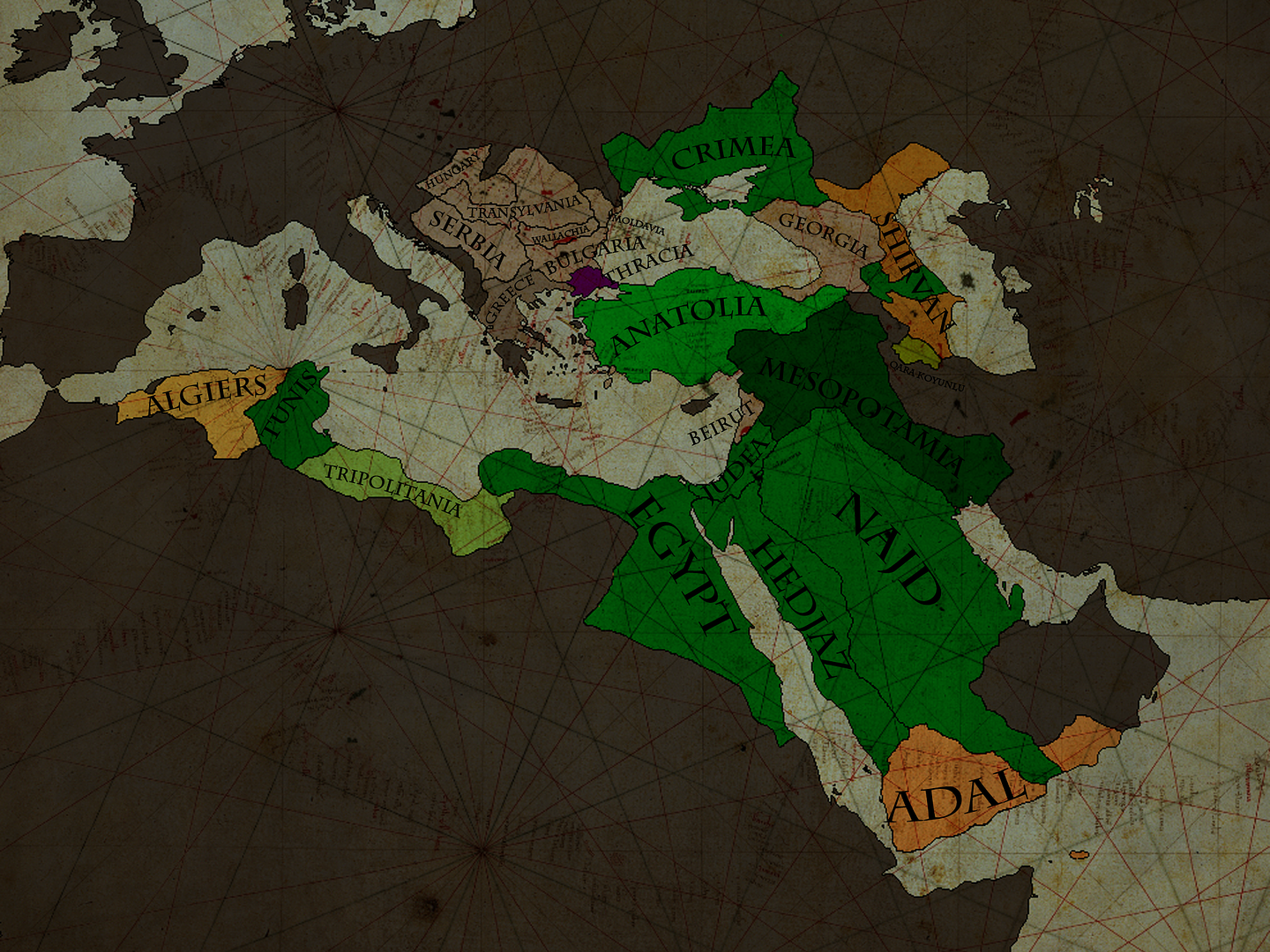
And THAT, Ladies and Gentlemen, is an Empire.
It'll be Dead within the Decade.
@Enewald: Where's the fun in that?
~~*~~
The World of 1600
Chapter 1: The Ottoman Empire
The Reforms and Conquests of Suleiman
Part V
The World of 1600
Chapter 1: The Ottoman Empire
The Reforms and Conquests of Suleiman
Part V
Ibrahim's conquest of Hungary and Suleiman's victory over Persia marked the last external threat either regent would face, as by this point the Ottoman Empire was indisputably the most powerful nation of the world. The only hostilities that brought themselves to the Ottoman Table would be a brief rebellion in Bosnia which would spill over into Serbia and Ottoman Hungary before being quelled by Ibrahim, and a rebellion in the territories seized from Persia which would prove significantly more damaging.
The Rebellion in Bosnia drew initially from issues with Ibrahim's reorganized conscription laws which the local governor was incapable of enforcing. The Rebellion itself lasted only four months, quickly seizing control of Bosnia and Serbia and executing the Governors Ibrahim had appointed there. While Ibrahim gathered his troops in Bulgaria, the army of Transylvania was already moving East under the command ot Stephen Báthory, the Governor-General appointed to administrate the area.
Although it would be Ibrahim who would finally defeat the Revolutionary army in Bosnia and destroy it, Stephen's efforts would push the armies from Serbia. Ibrahim would officially take control of Stephen's army to persue the revolutionaries, leaving Stephen in control of the land they had reconquered. Although Stephen would not gain control of Serbia itself, this period of time would see him gain great influence in Serbia and Bosnia. Although Stephen would never rule as Duke of Transylvania, instead passing that honor on to his brother Mihály, he retains dominance over the affairs of Transylvania to this day.
Stephen and his family would remain loyal to the Ottoman Empire until the death of Ibrahim. In return for their loyalty and ability, the administrative region of Transylvania saw a massive gain in territory, drawing virtually the whole of Ottoman Hungary under its control. Serbia and Bosnia would be merged into a single unit under the control of Ibrahim himself for several years before being passed to a hand picked General.
At the other end of the Empire, Suleiman himself had been likewise called to deal with a revolt in the recently conquered Persian Lands, which would remain a financial and military drain on the Empire's resources. Suleiman's son Jem had contributed several victories to suppressing the revolutionaries, and had himself dealt with this problem since the acquisition of the territory, however by 1581 the situation had spiraled out of his control.
Suleiman's entrance into the conflict would by its very nature greatly reduce the ability of the revolting powers, as it became increasingly clear that they were being funded by the Persian Shah himself, fresh from a crushing victory over the small states of the East. However, the presence of Suleiman and an astounding one quarter of the Ottoman Army on their border would make a potential war far too likely and of too great a risk to allow.
The remaining rebels would be swiftly defeated and pushed once more into Persia itself, bringing the area to some semblance of peace. The true end result of this rebellion would be the deepening rivalry between Suleiman's two sons. Suleiman had at this point not named his successor for Eastern Regent of the Ottoman Empire, and this rebellion prompted Suleiman's eldest son, Mustafa, to present his case for successor, citing this as an obvious example of Jem's lack of ability.
Suleiman would not entertain these discussions and made no change to the succession or lack there of, thus leaving the succession still uncertain throughout all of the Ottoman Empire. Although the Sultan himself still reigned in title and had a chosen successor, his lack of power rendered this pointless. In contrast, neither Suleiman nor Ibrahim had defined any sort of succession for the positions of Regent. Suleiman had not decided between his two sons, and Ibrahim had no sons having never married. Why this was the case remains a mystery.
Despite these looming problems, the Empire itself was in a state of peace and stability, as the above were merely two isolated incidents. Given the sheer breadth of territory administrated by the Ottoman State, two localized provincial revolts hardly registered, and in most cases the people of the Empire remained blissfully free of the chaos so quickly consuming Europe.
All of this would change on September Ninth, 1585, when Regent Suleiman would take his life, plunging the Ottoman Empire into the depths of the Ottoman Regent's War.

The Ottoman Empire at 1585, on the eve of Suleiman's Suicide.
~~*~~
And THAT, Ladies and Gentlemen, is an Empire.
It'll be Dead within the Decade.


